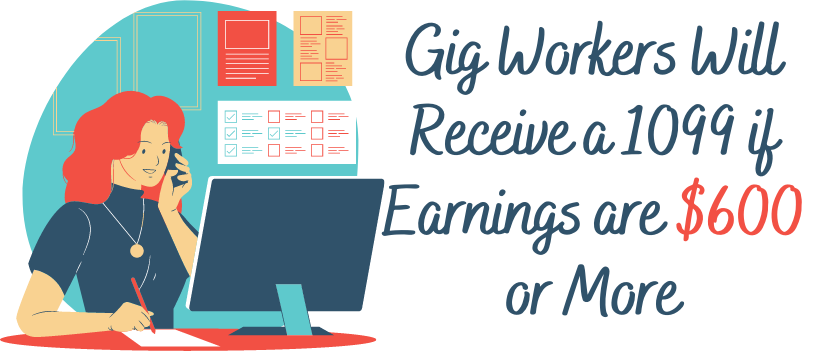Are you a gig worker earning income from companies such as Uber or Airbnb? Or perhaps you sell your goods on Ebay or Etsy. Did you not claim income on your tax return because you didn’t keep good records and didn’t receive a 1099-K for they year? I have important information for you which will affect your tax returns for the future.
First, let me explain a little bit about the purpose of a 1099 form. The IRS wants individuals and owners of partnerships to claim all of the income they receive, so those who pay specific types of people with certain payment types (usually cash, check or bank debit) are to report the amounts paid to these people. This guarantees the IRS will receive the tax due on the income earned.
There are various forms of 1099s. The ones heard most often are the 1099-MISC, 1099-NEC (which was new for 2020 and reports non-employee compensation) and the 1099-K which is issued by 3rd party processors such as Paypal for monies run through their payment portals, as well as merchant accounts that process credit card payments for their clients.
Up until 2020, if a payee did not have 200 transactions or over $20,000 in earnings, a 1099-K was not issued. However, this will change in 2022 (with forms filed in 2023) due to the signing of the American Rescue Plan Act of 2021, and those paid $600.00 or more will now receive a 1099-K each year.
The IRS estimates that 80% of those working in the gig economy did not receive 1099-K forms, and therefore did not include these earnings on their income tax returns thereby increasing the tax gap of what should have been paid and what actually was.
So, if you have not already been asked to supply a W-9 form to payment processors, you may be required to submit it soon. The information you will need to provide includes your legal name as shown on your income tax return, business name if different than your legal name, the type of entity, address, and tax identification number which is either your Social Security Number or an Employer Identification Number. Remember to sign and date the form as well.
Remember, even if you don’t receive a 1099 form, you are required to report income earned. And with these new rules, unless you earn less than $600 in a calendar year, you will receive a 1099-K, and the IRS will know how much money was processed for payments made to you from third-party processors.
If you have questions regarding 1099s and how information is reported, feel free to reach out to us for answers. We can be reached at 310-534-5577 or [email protected]. We also share information on this as well as many other topics on our website www.abandp.com.
